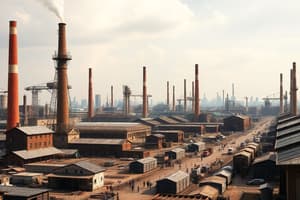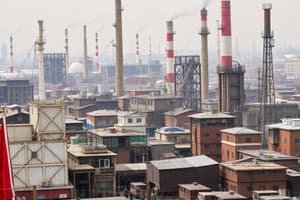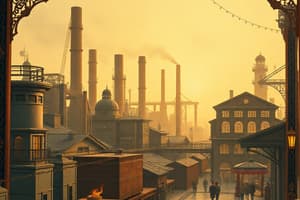Podcast
Questions and Answers
What was the main purpose of Ellis Island?
What was the main purpose of Ellis Island?
- To promote urbanization
- To serve as a processing station for European immigrants (correct)
- To restrict immigration from Asia
- To provide housing for immigrants
How did the conditions at Angel Island differ from those at Ellis Island?
How did the conditions at Angel Island differ from those at Ellis Island?
- Angel Island often processed immigrants under harsher conditions (correct)
- Ellis Island processed immigrants from Asia
- Angel Island had more favorable conditions for immigrants
- Both stations treated immigrants equally
What is the primary distinction between a migrant and an immigrant?
What is the primary distinction between a migrant and an immigrant?
- Migrants seek better opportunities, while immigrants intend to live permanently (correct)
- Immigrants can't return to their countries, but migrants can
- Immigrants move within a country, whereas migrants move internationally
- Migrants have a specific job, while immigrants look for jobs
Which term refers to urban areas characterized by poverty and substandard living conditions?
Which term refers to urban areas characterized by poverty and substandard living conditions?
What does assimilation involve regarding immigrants?
What does assimilation involve regarding immigrants?
What does the Chinese Exclusion Act symbolize in U.S. history?
What does the Chinese Exclusion Act symbolize in U.S. history?
What literary work highlighted the poor working conditions in the meatpacking industry during industrialization?
What literary work highlighted the poor working conditions in the meatpacking industry during industrialization?
Why were unions and strikes formed during industrialization?
Why were unions and strikes formed during industrialization?
What distinguishes immigrants from migrants?
What distinguishes immigrants from migrants?
How did experiences differ between immigrants processed at Ellis Island and those at Angel Island?
How did experiences differ between immigrants processed at Ellis Island and those at Angel Island?
What are examples of push factors in migration?
What are examples of push factors in migration?
Which analogy describes different cultures coexisting while maintaining distinct identities?
Which analogy describes different cultures coexisting while maintaining distinct identities?
What was a significant challenge faced by Asian immigrants at Angel Island?
What was a significant challenge faced by Asian immigrants at Angel Island?
Which statement best describes the effects of urbanization during industrialization?
Which statement best describes the effects of urbanization during industrialization?
What consequence did the Transcontinental Railroad have for Native Americans?
What consequence did the Transcontinental Railroad have for Native Americans?
What historical policy exemplified the role of xenophobia in shaping immigration regulations?
What historical policy exemplified the role of xenophobia in shaping immigration regulations?
Flashcards
Ellis Island
Ellis Island
A processing center in New York Harbor for European immigrants arriving in the United States, opened in 1892.
Angel Island
Angel Island
An immigration station in San Francisco Bay that primarily processed Asian immigrants, often with harsher conditions than Ellis Island.
Industrialization
Industrialization
The widespread development of industries, transforming societies through manufacturing, urban growth, and new technologies.
Tenements
Tenements
Signup and view all the flashcards
Assimilation
Assimilation
Signup and view all the flashcards
Chinese Exclusion Act
Chinese Exclusion Act
Signup and view all the flashcards
Xenophobia
Xenophobia
Signup and view all the flashcards
Carlisle Indian Industrial School
Carlisle Indian Industrial School
Signup and view all the flashcards
Push vs. Pull Factors
Push vs. Pull Factors
Signup and view all the flashcards
Ellis Island vs. Angel Island
Ellis Island vs. Angel Island
Signup and view all the flashcards
Melting Pot vs. Salad Bowl
Melting Pot vs. Salad Bowl
Signup and view all the flashcards
Transcontinental Railroad's Impact
Transcontinental Railroad's Impact
Signup and view all the flashcards
Immigrant Living Conditions
Immigrant Living Conditions
Signup and view all the flashcards
Working Conditions in Industrialization
Working Conditions in Industrialization
Signup and view all the flashcards
'The Jungle' and its Impact
'The Jungle' and its Impact
Signup and view all the flashcards
Study Notes
Migration, Immigration, and Industrialization
- Key Terms:
- Ellis Island: NYC immigration station for European immigrants (opened 1892)
- Angel Island: San Francisco Bay immigration station for Asian immigrants (opened 1910), often harsher conditions
- Immigrant: Person permanently moving to another country
- Migrant: Person moving temporarily to another location (e.g., for work)
- Industrialization: Widespread expansion of industries, impacting societies through manufacturing, urban growth
- Tenements: Overcrowded, substandard urban housing
- Slums: Poor urban areas with widespread poverty and poor living conditions
- Assimilation: Immigrants adapting to the new culture
- Patent: Legal right granted to an inventor for exclusive use of their invention
- Chinese Exclusion Act: 1882 US law banning Chinese laborers, first major immigration restriction targeting an ethnicity
- Urbanization: Growth of cities fueled by migration for industrial jobs
- Xenophobia: Fear or hatred of foreigners/different cultures
- Carlisle Indian Industrial School: Boarding school aiming to assimilate Native American children
- The New Colossus: Poem symbolizing the US as a haven for immigrants, inscribed on the Statue of Liberty
- Sweatshops: Factories with poor conditions, long hours, and low wages, often employing immigrants
- Ethnic Enclaves: Immigrant communities maintaining their ethnic cultures
- Assembly Line: Manufacturing process with repetitive tasks for product assembly
- "The Jungle": Upton Sinclair's novel exposing meatpacking industry conditions
- Government Grants: Financial aid for projects like infrastructure
- Unions/Strikes: Worker organizations for better conditions/wages
- Migrants vs. Immigrants:
- Similarities: Both move for better opportunities
- Differences: Migrants typically move temporarily, immigrants permanently
- Ellis Island vs. Angel Island:
- Ellis Island: Primarily processed European immigrants, generally quicker and less rigorous
- Angel Island: Primarily processed Asian immigrants, longer detentions and interrogations
- Push/Pull Factors:
- Push Factors: Conditions causing people to leave (e.g., war, famine)
- Pull Factors: Conditions attracting people (e.g., job opportunities, safety)
- Melting Pot vs. Salad Bowl:
- Melting Pot: Cultures blend into a unified national identity
- Salad Bowl: Diverse cultures coexist maintaining separate identities
- Migrant/Immigrant Experiences by Group:
- Asian Immigrants: Faced xenophobia, the Chinese Exclusion Act, and harsh conditions (Angel Island)
- European Immigrants: Faced challenges in adapting but often found more acceptance in cities
- Native Americans: Displaced by westward expansion and assimilation efforts (Carlisle School)
- Pioneers/Frontier Settlers: Encountered hardship, conflicts with Native Americans, and physical challenges
- Impact of Industrialization and Urbanization:
- Positive: Economic growth, technological advancements, job opportunities
- Negative: Overcrowded cities, pollution, slums, poor living/working conditions
- Transcontinental Railroad Impact:
- Native Americans: Loss of land, cultural destruction
- Pioneers: Facilitated westward migration
- Chinese Immigrants: Exploited labor for construction, later faced xenophobia
- Wider Impact: Boosted trade, stimulated urban growth, harmed environment and marginalized groups
- Life of Immigrants/Migrants:
- Working Conditions: Long hours, low wages, dangerous environments (sweatshops)
- Living Conditions: Crowded tenements, poor sanitation
- Experiences: Challenges with assimilation, xenophobia, but strong ethnic enclaves provided community support
- Role of Xenophobia in Immigration Policy:
- Historical Examples: Chinese Exclusion Act, literacy tests, quotas targeting specific ethnicities
- Modern Examples: Border walls, travel bans, and attitudes toward refugees
- "The Jungle":
- Exposing unsafe meatpacking conditions, leading to reforms like the Pure Food and Drug Act
- Key Themes:
- Recognize diverse experiences of immigrant groups
- Industrialization/urbanization had both advantages/disadvantages
- Analyze migration on individuals and society (culture, economy, environment)
Detailed Topics - Specific Examples
- Chinese Exclusion Act: Example of xenophobic policy restricting an immigrant group.
- Carlisle Indian School: Aggressive assimilation effort used to erase Native American culture.
- "The Jungle": Book highlighting the harsh realities of industrial work.
- Transcontinental Railroad: Example of massive infrastructure projects impacting various groups and the environment.
Studying That Suits You
Use AI to generate personalized quizzes and flashcards to suit your learning preferences.





